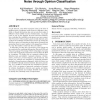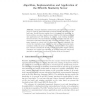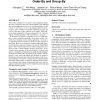1044 search results - page 125 / 209 » A Fuzzy Semantics for Semantic Web Languages |
AND
2010
13 years 5 months ago
2010
On the Internet, users often encounter noise in the form of spelling errors or unknown words, however, dishonest, unreliable, or biased information also acts as noise that makes i...
GEOS
2007
Springer
14 years 1 months ago
2007
Springer
Abstract. Semantic similarity measurement gained attention as a methodology for ontology-based information retrieval within GIScience over the last years. Several theories explain ...
EKAW
2008
Springer
13 years 9 months ago
2008
Springer
Similarity measures play a key role in the Semantic Web perspective. Indeed, most of the ontology related operations such as ontology learning, ontology alignment, ontology ranking...
SIGMOD
2007
ACM
14 years 8 months ago
2007
ACM
The Boolean semantics of SQL queries cannot adequately capture the "fuzzy" preferences and "soft" criteria required in non-traditional data retrieval applicati...
EUROMICRO
2003
IEEE
14 years 1 months ago
2003
IEEE
Recently, several languages for web service composition have emerged (e.g., BPEL4WS and WSCI). The goal of these languages is to glue web services together in a process-oriented w...



